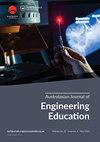Beyond skills: building research capacity through cognitive apprenticeship and social capital
Q1 Social Sciences
Australasian Journal of Engineering Education
Pub Date : 2023-01-02
DOI:10.1080/22054952.2023.2230068
引用次数: 1
Abstract
ABSTRACT International calls for building capacity in engineering education research (EER) as a discipline have led to the development of workshops, training programs, and resources for scholars to learn and practice EER. Building capacity in EER as a discipline depends not only on the research skills of scholars, but also their sustained engagement in the discipline through the development of strong social networks. Understanding how scholars develop robust social networks through mentorship will support building research capacity in the field. This study was designed to answer the research question: How do established engineering education researchers help new engineering education researchers build social capital for EER through mentoring relationships? It draws on semi-structured interviews leveraging critical incident technique conducted with nine participants: two mentors and seven mentees. The findings suggest that mentors serve critical roles in the professional development of engineering faculty (academics) in EER as a discipline, providing training in methods and theories, developing mentees’ social networks, and providing moral support for entering a new field. Building capacity efforts and related structured mentoring programs (and mentoring training) should emphasise the importance of developing mentees’ social networks to support sustained engagement in EER.超越技能:通过认知学徒制和社会资本建设研究能力
国际上对工程教育研究(EER)作为一门学科的能力建设的呼吁,导致了学者学习和实践EER的研讨会、培训计划和资源的发展。建立EER作为一门学科的能力不仅取决于学者的研究技能,还取决于他们通过发展强大的社会网络而持续参与该学科。了解学者如何通过师徒关系发展强大的社会网络将有助于该领域的研究能力建设。本研究旨在回答研究问题:已成立的工程教育研究者如何透过师徒关系,协助新成立的工程教育研究者建立EER的社会资本?它利用利用关键事件技术的半结构化访谈,与九名参与者进行了访谈:两名导师和七名学员。研究结果表明,导师在工程工程学院(学者)的专业发展中发挥着关键作用,提供方法和理论培训,发展学员的社会网络,并为进入新领域提供道德支持。能力建设工作和相关的结构化指导计划(和指导培训)应强调发展学员的社会网络以支持持续参与环境教育的重要性。
本文章由计算机程序翻译,如有差异,请以英文原文为准。
求助全文
约1分钟内获得全文
求助全文
来源期刊

Australasian Journal of Engineering Education
Social Sciences-Education
CiteScore
6.40
自引率
0.00%
发文量
8
 求助内容:
求助内容: 应助结果提醒方式:
应助结果提醒方式:


